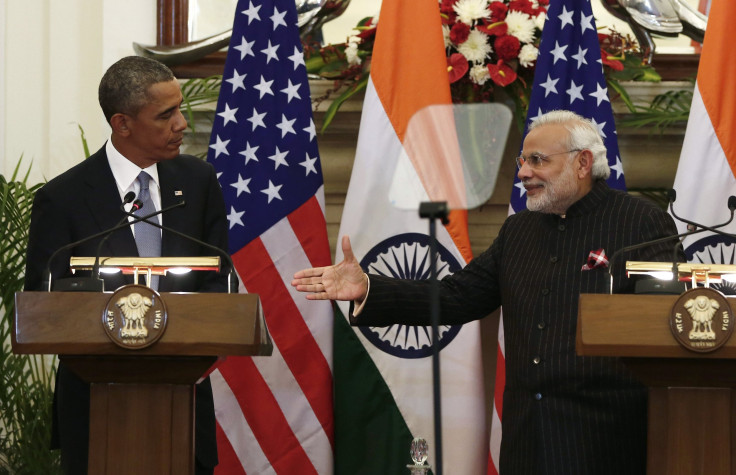Obama's India Visit: US, India Move Forward On Operationalizing Stalled Civil Nuclear Deal

NEW DELHI -- Leaders of India and the U.S. said Sunday the countries had moved toward breaking a six-year deadlock that has kept a civil nuclear deal between the two nations from being put into action. India’s Prime Minister Narendra Modi and U.S. President Barack Obama made the comments at a joint press conference here Sunday, when the former began hosting the latter on his three-day visit to India as the chief guest at the country’s Republic Day celebration.
Modi said the nuclear deal “was the centerpiece of Indo-U.S. understanding” and that in the past few months, the two countries had “worked with purpose” to take it forward. “I am pleased that six years after signing the nuclear deal, we are moving toward nuclear commerce in consistence with law, into obligations,” the Indian prime minister said.
Obama said the two countries had “achieved a breakthrough understanding” on the issues that were delaying the deal’s implementation.
“Noting that the contact group set up in September 2014 to advance implementation of bilateral civil nuclear cooperation has met three times in December and January, the leaders welcomed the understandings reached on the issues of civil nuclear liability and administrative arrangements for civil nuclear cooperation, and looked forward to U.S.-built nuclear reactors contributing to India’s energy security at the earliest,” the two countries said in a joint statement.
Although there was no mention of India’s arch rival and western neighbor Pakistan during the leaders’ press conference, the statement indicated Modi and Obama “reaffirmed the need for joint and concerted efforts to disrupt entities such as Lashkar-e-Tayyiba, Jaish-e-Mohammad, D Company and the Haqqani Network.” It also noted the two “agreed to enter discussions to deepen collaboration on [United Nations] terrorist designations, and reiterated their call for Pakistan to bring the perpetrators of the November 2008 terrorist attack in Mumbai to justice.”
Separately, the two countries also issued an “India-U.S. Delhi Declaration of Friendship,” saying they would hold regular summits and “elevate [their] strategic dialogue to a strategic and commercial dialogue.”
Meanwhile, all the details of the newly reached agreement on the existing civil nuclear deal between the two countries were not immediately clear.
Still, it appears to be set in stone at this point. “We have broken the logjam of the past few years,” India’s Foreign Secretary Sujatha Singh said at a press conference in New Delhi Sunday.
Consistent with the two countries’ joint statement, Singh said they had “reached an understanding on two outstanding issues, namely, civil nuclear liability and the administrative arrangements for implementing our 123 Agreement.” She emphasized: “Let me underline, we have reached an understanding. The deal is done.”
Several U.S. companies -- the General Electric Co. and the privately held Westinghouse Electric Co. LLC -- have been looking to establish nuclear power plants in India, pending the operationalization of the deal.
It was in July 2005 that the framework for a civil nuclear agreement between the two countries was first broached, as recounted by the South Asian Strategic Stability Institute. Manmohan Singh, then the Indian prime minister, and George W. Bush, then the American president, announced it in a joint statement. The text of the final agreement was released in August 2007. The deal was subsequently OK’d by the U.S. Congress in October 2008.
Under the agreement, the U.S. offered India full civil nuclear cooperation after New Delhi agreed to first separate its civilian and military nuclear facilities and then open its civilian reactors to inspections by the International Atomic Energy Agency.
Since its signing, however, the deal has remained largely unfruitful. The biggest stumbling blocks have been the liability clauses in a 2010 piece of Indian legislation that has acted to prevent several countries, including the U.S., from selling nuclear reactors to India, according to the government-funded Institute for Defense Studies and Analyses in
Put simply, the Indian law makes a supplier directly liable in case of a nuclear accident, while other national laws around the world make an operator primarily liable in such an event. If India were to follow global norms, the entire liability in case of an accident would fall upon the Nuclear Power Corp. of India, a government-owned company that operates all the nuclear power plants in the country. Effectively, therefore, the Indian government would be responsible for damages in case of a mishap.
India now wants to form a nuclear insurance pool to cover suppliers of both its existing nuclear plants and the ones that are set up under the several civil nuclear agreements that it has signed, as noted by the Press Trust of India. While India may not be able to change its 2010 law, the insurance pool is being seen as the most workable way around it, as pointed out by the Times of India.
Last week, the Times of India reported that talks between the two countries to revive the civil nuclear agreement between the two countries had hit a roadblock after an American demand to “flag rights in perpetuity” for any equipment or material used in a U.S.-built reactor.
The Americans had been insisting on rights to continuously monitor the use of any equipment or material in a U.S.-built reactor even when sourced from a third country. In November, the Times of India reported the U.S. was demanding the “tracking of nuclear fuel through the entire cycle.”
Ironically, Modi’s own Bharatiya Janata Party had sought a tough liability law while in opposition between 2004 and 2014, when the Indian National Congress party was in office as head of the United Progressive Alliance government, led by former Prime Minister Singh. As IBNLive reported at the time, he virtually staked his coalition government on signing the civil nuclear deal, which had become a contentious political issue in India.
© Copyright IBTimes 2025. All rights reserved.





















